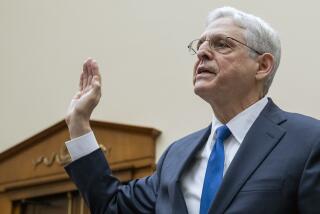Reporter Defends Refusal to Talk
WASHINGTON — New York Times reporter Judith Miller said Tuesday that if the federal prosecutor who sent her to jail didn’t bring criminal charges in his investigation of the Bush administration, she would wonder why she spent nearly three months behind bars.
“If he brings indictments, if he has a very serious case, then I might have to say perhaps his zealousness with respect to this mission was justified,” Miller said of special prosecutor Patrick J. Fitzgerald.
Miller’s comments on CNN’s “Lou Dobbs Tonight” came in her first TV interview since her release from a federal detention facility Thursday. She had been jailed for refusing to cooperate in Fitzgerald’s investigation.
The prosecutor has been looking into who leaked the identity of covert CIA officer Valerie Plame to journalists. The leaks occurred days after Plame’s husband, former Ambassador Joseph C. Wilson IV, suggested in a newspaper opinion piece that the Bush administration had twisted prewar intelligence on Iraq.
Miller defended her refusal, followed by her reversal after 85 days in jail, to testify about conversations with her source, identified in news reports as Vice President Dick Cheney’s chief of staff, I. Lewis “Scooter” Libby.
Miller said people wrote “lots of postcards saying I should testify” and saying that she was protecting the Bush administration.
“I knew and I know I wasn’t covering for anybody,” she said.
The journalist said her lawyers were unable to get Fitzgerald to agree long ago to limit the scope of his planned questioning of her conversations with her source.
Miller, imprisoned even though she never wrote an article about the matter, said she was unwilling to accept a blanket waiver of confidentiality from her source.
“Until I knew that that source genuinely wanted me to testify, and I heard that from him, I was willing to sit in jail.”
Miller called the Alexandria, Va., detention center where she was jailed “the most soulless place” she had ever been.
“It was demeaning. It was degrading. It was very lonely,” she said.
More to Read
Sign up for Essential California
The most important California stories and recommendations in your inbox every morning.
You may occasionally receive promotional content from the Los Angeles Times.










